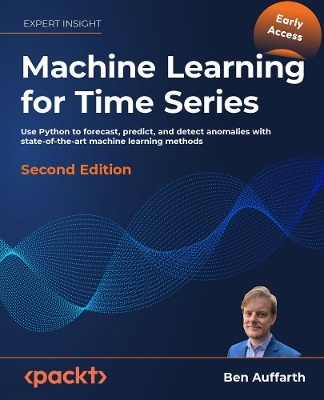
Machine Learning for Time-Series with Python
Packt Publishing Limited (Verlag)
978-1-83763-133-9 (ISBN)
Key Features
Explore popular and state-of-the-art machine learning methods, including the latest online and deep learning algorithms
Learn to increase the accuracy of your predictions by matching the right model to your problem
Master time series in Python via real-world case studies on operations management, digital marketing, finance, and healthcare
Book DescriptionThe Python time-series ecosystem is a huge and challenging topic to tackle, especially for time series since there are so many new libraries and models. Machine Learning for Time Series, Second Edition, aims to deepen your understanding of time series by providing a comprehensive overview of popular Python time-series packages and helping you build better predictive systems.
This fully updated second edition starts by re-introducing the basics of time series and then helps you get to grips with traditional autoregressive models as well as modern non-parametric models. By observing practical examples and the theory behind them, you will gain a deeper understanding of loading time-series datasets from any source and a variety of models, such as deep learning recurrent neural networks, causal convolutional network models, and gradient boosting with feature engineering. This book will also help you choose the right model for the right problem by explaining the theory behind several useful models. New updates include a chapter on forecasting and extracting signals on financial markets and case studies with relevant examples from operations management, digital marketing, and healthcare.
By the end of this book, you should feel at home with effectively analyzing and applying machine learning methods to time series.What you will learn
Visualize time series data with ease
Characterize seasonal and correlation patterns through autocorrelation and statistical techniques
Get to grips with classical time series models such as ARMA, ARIMA, and more
Understand modern time series methods including the latest deep learning and gradient boosting methods
Choose the right method to solve time-series problems
Become familiar with libraries such as Prophet, sktime, statsmodels, XGBoost, and TensorFlow
Understand both the advantages and disadvantages of common models
Evaluate high-performance forecasting solutions
Who this book is forThis book is ideal for data analysts, data scientists, and Python developers who want instantly useful and practical recipes to implement today, and a comprehensive reference book for tomorrow. Basic knowledge of the Python Programming language is a must, while familiarity with statistics will help you get the most out of this book.
Ben Auffarth is a full-stack data scientist with more than 15 years of work experience. With a background and Ph.D. in computational and cognitive neuroscience, he has designed and conducted wet lab experiments on cell cultures, analyzed experiments with terabytes of data, run brain models on IBM supercomputers with up to 64k cores, built production systems processing hundreds and thousands of transactions per day, and trained language models on a large corpus of text documents. He co-founded and is the former president of Data Science Speakers, London.
Table of Contents
Introduction
Dealing with Time Series in Python
Preprocessing Time-Series
Forecasting with Statistical Models
Probabilistic Forecasting
Machine Learning for Time Series
Deep Learning
Unsupervised machine learning
Drift and adaptive models
Event time prediction
Reinforcement learning
Time Series in Finance
| Erscheinungsdatum | 09.08.2023 |
|---|---|
| Verlagsort | Birmingham |
| Sprache | englisch |
| Maße | 191 x 235 mm |
| Themenwelt | Informatik ► Theorie / Studium ► Künstliche Intelligenz / Robotik |
| Wirtschaft ► Volkswirtschaftslehre ► Ökonometrie | |
| ISBN-10 | 1-83763-133-6 / 1837631336 |
| ISBN-13 | 978-1-83763-133-9 / 9781837631339 |
| Zustand | Neuware |
| Informationen gemäß Produktsicherheitsverordnung (GPSR) | |
| Haben Sie eine Frage zum Produkt? |
aus dem Bereich


